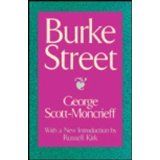Scomo

Russell Kirk's autobiography, The Sword of Imagination, is a splendid work. I read it carefully while preparing this piece ten years ago. For the past decade, the person of George Scott-Moncrieff has stuck in my mind, so much so that I actually bought and read (a chunk of) his Burke Street.
Scomo was poor, widowed, Catholic, and happy. Although a father of two, he was somehow content with poverty (when one dined at his apartment, "one grew adept at catching the soup bowl before it slid into one's lap" due to the sloping floors). He was happy to create little works of great literary art that gained him little remuneration.
It's a blessed life, and one attainable by anyone who simply accepts his lot in life without further thought to acquisition. Easier said than done, of course, especially if you have children: "When does such detachment become irresponsibility? Then again, is it irresponsible to set an acquisitive example for your children?" Those are questions worth grappling with. Reading vignettes about a man like Scomo serve the purpose of stimulating them.
Kirk on Scomo:
Scott-Moncrieff was the worst-dressed gentleman in all Scotland, indifferent to circumstance, endowed with the consolation of philosophy. . . .
Few know his little book of devotional meditations, This Day, in which happiness and resignation walk side by side. Fewer still know his essay "Growing Old," though many might be consoled by it. George's spiritual writings brought to Kirk a fuller awareness of the soul. Were Kirk to win a million dollars in a lottery, he would publish in splendid editions Scomo's books of quiet wisdom, beautifully expressed.
